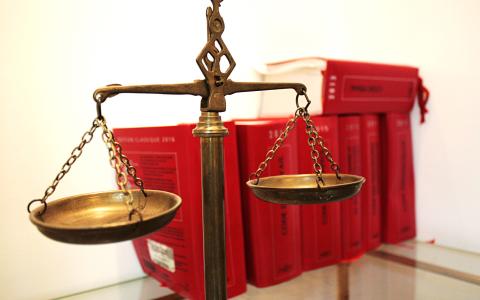
(MSN) - The heirs of Otto von Bismarck, Germany’s legendary “Iron Chancellor”, are embroiled in a bitter courtroom battle over a fortune as grand as their family name.
Carl-Eduard von Bismarck, the so-called “black sheep” of the family, is suing his younger siblings, Gregor and Vanessa, for an €83m (£70m) share of their inheritance.
This decades-long battle over wealth and legacy has brought the family’s scandals and dysfunctions into stark public view, tarnishing the name of a man once synonymous with German unification and diplomacy.
The courtroom clash in Lubeck, northern Germany, is the latest chapter in a saga of personal grudges, police interventions and public disgrace that threatens to overshadow the Bismarcks’ historic contributions.
The siblings are the great-great-grandchildren of Otto von Bismarck, who masterminded the unification of Germany in the 19th century.
Carl-Eduard, 63, has earned a reputation as the black sheep of the family and a playboy princeling, disinherited by his father, Prince Ferdinand von Bismarck, in 2002 due to his flamboyant lifestyle.
Once dubbed “Germany’s laziest MP” for his absenteeism during his brief political career, Carl-Eduard’s reputation stands in stark contrast to his ancestor’s legacy of diplomacy and statecraft.
The inheritance dispute has brought the siblings to a court in the northern town of Lubeck. Reports from German media describe tense proceedings, with the siblings avoiding eye contact as their lawyers spoke on their behalf.
The judge has requested further documentation to determine the true value of the Bismarck estate, estimated to be worth as much as €1bn. Gregor argues that Carl-Eduard received a significant loan from their father, which, if proven, could reduce his claim.
The feud dates back decades, with tensions escalating even before the death of Prince Ferdinand in 2019. In 2010, police were called to Friedrichsruh Castle, the family’s ancestral seat near Hamburg, during an alleged altercation between Carl-Eduard and his 71-year-old mother, Princess Elisabeth.
Carl-Eduard reportedly tried to evict her from the estate, leading to a confrontation so heated that officers arrived fearing weapons might be involved.
“The police arrived, and suddenly I was lying handcuffed on the ground with my face in the sand,” Carl-Eduard told the Bild newspaper at the time. His mother later withdrew a legal complaint against him.
He told Bild in an interview in 2010. “And my brother was shouting at the officers to test me for drugs and alcohol. They did, and when the results were negative, he told them: ‘Get better equipment.’”
His mother, he said, had withdrawn a legal complaint against him for bodily harm and had given a sworn statement that he had never threatened her with a hunting weapon.
Gregor, who inherited Friedrichsruh and its adjoining forestry estate, has since banned Carl-Eduard from the property altogether. Observers of the current court case see little hope for reconciliation.
The feud’s backdrop is the waning public image of Otto von Bismarck, the family’s towering historical figure. Once celebrated as a unifier of Germany, his legacy has faced increasing scrutiny over his role in German colonialism and his autocratic tendencies.
In 2022, German officials removed his name and portrait from a hall in the foreign ministry, renaming it the “Hall of German Unity”. Critics argued that Bismarck’s legacy does not align with democratic values, citing his disregard for women’s rights and his promotion of colonial expansion.
Ernst von Bismarck, a family member, protested the move, stating that “history cannot be eradicated.” The Bismarck Family Association, with hundreds of members, continues to advocate for a more balanced view of the chancellor’s legacy, lamenting what they see as an oversimplified vilification of their ancestor.
The Bismarck dynasty’s internal strife and diminishing public prestige reflect a broader story of aristocratic decline. Gregor, a former Hollywood producer, has described his brother’s behaviour as bringing unnecessary drama to their parents in their later years. Meanwhile, Carl-Eduard has admitted to struggles with addiction, acknowledging that his actions have tarnished the family’s reputation.
The judge in Lubeck has urged the siblings to consider settling the matter privately but given the history of animosity, this seems unlikely. As the courtroom battle continues, the once-proud Bismarck name remains embroiled in personal scandals and public controversies, a far cry from the days when it symbolised the height of European diplomacy.
The Independent has contacted Carl-Eduard for comment.
The Independent is the world’s most free-thinking news brand, providing global news, commentary and analysis for the independently-minded. We have grown a huge, global readership of independently minded individuals, who value our trusted voice and commitment to positive change. Our mission, making change happen, has never been as important as it is today.
By Athena Stavrou



